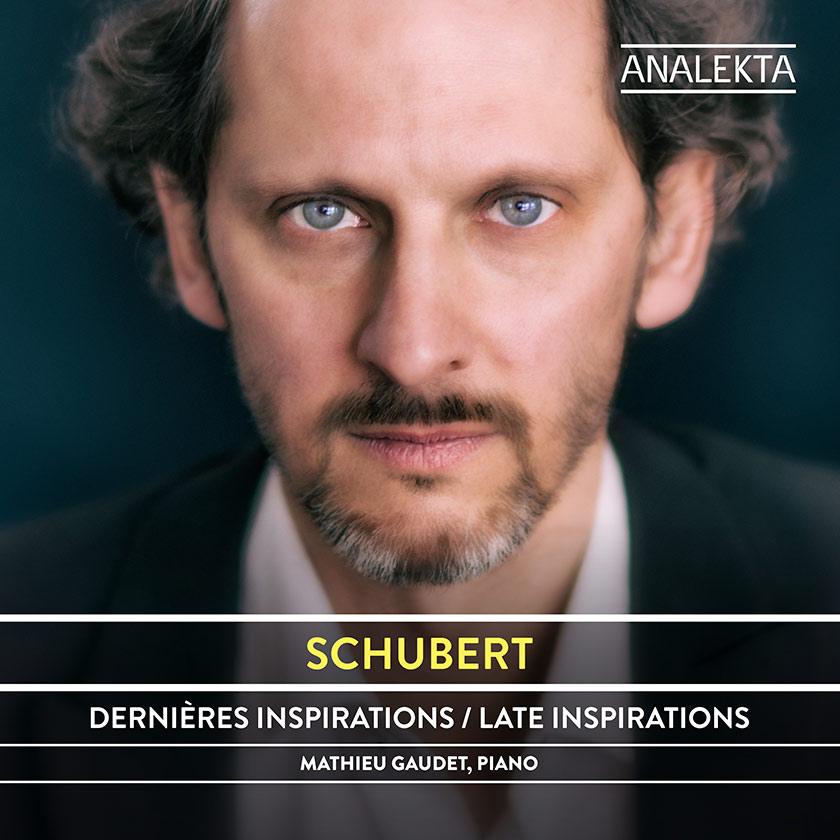 Dernières Inspirations/Late Inspirations; Franz Schubert: Klaviersonate Nr. 3 D. 459 + Ungarische Melodie D. 817 + Drei Klavierstücke D. 946; Mauthieu Gaudet, Klavier; 1 CD Analekta 9182; Aufnahme 12/2019, Veröffentlichung 06/2020 (62’34) - Rezension von Alain Steffen
Dernières Inspirations/Late Inspirations; Franz Schubert: Klaviersonate Nr. 3 D. 459 + Ungarische Melodie D. 817 + Drei Klavierstücke D. 946; Mauthieu Gaudet, Klavier; 1 CD Analekta 9182; Aufnahme 12/2019, Veröffentlichung 06/2020 (62’34) - Rezension von Alain Steffen
Auf dieser 2. CD seiner Gesamtaufnahme der Klaviersonaten und wichtigsten Klavierwerke von Franz Schubert stellt der kanadische Pianist Mathieu Gaudet die frühe 3. Sonate D. 459 den Spätwerken Ungarische Rhapsodie D. 817 und Drei Klavierstücke D. 946 gegenüber. Somit ist der Untertitel Dernières Inspirations nicht ganz korrekt.
Mathieu Gaudet überrascht und fasziniert uns mit einem ungemein filigran gespielten Schubert. Ob in der jugendlichen Sonate, die Schubert mit 19 Jahren komponierte oder den Drei Klavierstücken aus dem Todesjahr 1828, Gaudet bleibt seinem Konzept treu, Schuberts Musik sehr detailfreudig und schlank wiederzugeben. Das ist kein Tastenlöwe, der den romantischen Gestus in den Mittelpunkt stellt, sondern ein feiner Zeichner, der die Struktur hinterfragt und das Emotional-Expressive in ein neues Gleichgewicht mit der melodischen Linie und der Architektur bringt. Natürlich kann man schwerere Interpretationen à la Barenboim, lyrischere à la Uchida oder intellektuellere à la Brendel vorziehen, aber Gaudets farbenreicher und z.T. sehr eleganter Schubert hat durchaus Potenzial und macht neugierig auf kommende Veröffentlichungen.
On this 2nd CD of his complete recording of the piano sonatas and most important piano works by Franz Schubert, Canadian pianist Mathieu Gaudet juxtaposes the early 3rd Sonata D 459 with the late works Hungarian Rhapsody D 817 and Three Piano Pieces D 946. Thus the subtitle Late Inspirations is not quite correct.
Mathieu Gaudet surprises and fascinates with an incredibly filigree Schubert. Whether in the youthful sonata that Schubert composed at the age of 19 or the Three Piano Pieces from the year of his death in 1828, Gaudet remains true to his concept of performing Schubert’s music in a very detailed and lean manner. He does not focus on the Romantic gesture, but questions the structure and brings the emotional-expressive side of the music into a new balance with the melodic line and the architecture. Of course, one can prefer more heavy interpretations à la Barenboim, more lyrical à la Uchida or more intellectual à la Brendel, but Gaudet’s colourful and elegant Schubert certainly has potential and makes one curious about future releases.


















